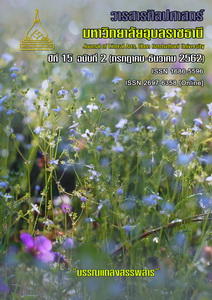THE CONSCIOUSNESS OF CRIME SECURITY MANAGEMENT IN COMMUNITY-BASED TOURISM OF BAAN JA BO, MAE HONG SON PROVINCE
Main Article Content
Abstract
The qualitative research to study the Consciousness of Crime
Security Management in Community-based Tourism of Baan Ja Bo, Mae
Hong Son Province employed the qualitative method. Data collection
by in-depth interviews 25 participants key person, analyze data using
content analysis. The findings of the research were as follows. The
current situations of the management, including common conditions,
locations, local organizations and communities were characterized in a
way facilitating the ongoing status of tourism by well-equipped
communities. The village had no serious crime, relatively low rates of
crime, risk, and insecurity. However, the main risks for safety were traffic
accidents and collapsing buildings. Though not having the crime
problems, the village with mindfulness strenuously enforced its
conspicuous regulations and procedures. For the cognition, the villagers
had knowledge of the management and an access to its related
information sources. For the affection, they were aware of and engaged
positively with this management and collaborated with the safety
measures of tourism. For the psychomotor/behavior, it was
systematically and continuously managed emphasizing on the villagers’
participation and cooperation. The recommendations for development
of the consciousness of crime safety management in the village are: for
cognition the provision of the training programs and updating of the
latest information related to the measures with the residents; for the
affection, the reinforcement of their consciousness and implications on
the security management; and for the psychomotor/behavior, the
collaboration of the members and their sense of ownership.
Suggestion: Encouragement of the consciousness of crime safety
management in community-based tourism requires an integration of
various related local agencies. The engagement of community
members must be centered.
Downloads
Article Details
References
กรุงเทพฯ : กระทรวงการท่องเที่ยวและกีฬา.
กรมการท่องเที่ยว. [ออนไลน์]. (2561). ยุทธศำสตร์พัฒนำกำรท่องเที่ยว. เข้าถึงได้
จาก : http://www.tourism.go.th.
กระทรวงการท่องเที่ยวและกีฬา. (2558). ยุทธศำสตร์กำรท่องเที่ยวไทย พ.ศ.2558-
2560. กรุงเทพฯ.
กาญจน์นภา พงศ์พนรัตน์. (2560). ภำพรวมสถำนกำรณ์และแนวโน้มกำร
พัฒนำกำรท่องเที่ยวโลก อำเซียนและไทย. วิทยาลัยนวัตกรรม
มหาวิทยาลัยธรรมศาสตร์.
ขวัญชนก นัยจรัญ และ กฤษณา ชาญณรงค์. (2561). บทบำทหน้ำที่ของมรดกภูมิ
ปัญญำทำงวัฒนธรรมในกำรสร้ำง อัตลักษณ์ชุมชน ตำบลหนองกะท้ำว
อำเภอนครไทย จังหวัดพิษณุโลก. Veridian E-Journal, Silpakorn
University. ปีที่ 11 (ฉบับที่ 3) : หน้า 329-344.
คณะทางานพัฒนาข้อมูลรายงานภาวะเศรษฐกิจ การท่องเที่ยวรายไตรมาส สานักงาน
ปลัดกระทรวงการท่องเที่ยวและกีฬา. (2559). รำยงำนภำวะเศรษฐกิจ
ท่องเที่ยว. กรุงเทพฯ : เอ็กเซลเลนท์ บิสเนส แมเนจเม้นท์.
มัทยา ศรีพนา. (2557). สถำนกำรณ์กำรท่องเที่ยวไทย เมื่อก้ำวเข้ำสู่ประชำคม
เศรษฐกิจอำเซียนในปี 2558 (The State of Thai Tourism in
Approach of ASEAN Economic Community in 2015). สานัก
วิชาการ สานักงานเลขาธิการวุฒิสภา. ปีที่ 4 (ฉบับที่ 17).
วิกิพีเดีย สารานุกรมเสรี. [ออนไลน์]. (2560). การท่องเที่ยว. เข้าถึงได้จาก :
https://th. wikipedia.org.
วิสูตร ฉัตรชัยเดช. [ออนไลน์]. (2560). กำรป้องกันอำชญำกรรมเชิงรุกโดยทฤษฎี
ส ำม เห ลี่ย ม อ ำช ญ ำก ร รม . เข้าถึงได้จ าก : http://ooty191-
thaicop.blogspot.com/2011/02/ proactive-crime-prevention-bycrime.
html?m=1.
โสภา จานงค์รัศมี, ธัชไท กีรติพงค์ไพบูลย์ และ กัลย์ธีรา ชุมปัญญา. (2558).
ท่องเที่ยวทั่วไทย สร้ำงรำยได้ทั่วถึง. วารสารเศรษฐกิจและสังคม
สานักงานคณะกรรมการพัฒนาเศรษฐกิจและสังคมแห่งชาติ. ปีที่ 52 (ฉบับ
ที่ 1) : หน้า 8-16.
ศูนย์วิจัยกสิกรไทย. [ออนไลน์]. (2561). แนวโน้มเศรษฐกิจและกำรท่องเที่ยวปี
2 5 6 1 . เ ข้ า ถึ ง ไ ด้ จ า ก : http://ttaa.or.th/wpcontent/
uploads/2017/09/เ ศ ร ษ ฐ กิจ แ ล ะ ก า ร ท่อ ง เ ที่ ย ว
18012561.pdf.
อรุณรุ่ง ปภาพสิษฐ และคณะ. (2555, กรกฎาคม-ธันวาคม). รูปแบบกำรสร้ำง
จิตสำนึกในกำรพัฒนำชุมชน. วารสาร
วิจัยราชภัฏพระนคร. ปีที่ 7 (ฉบับที่ 2) : หน้า 98-110.


